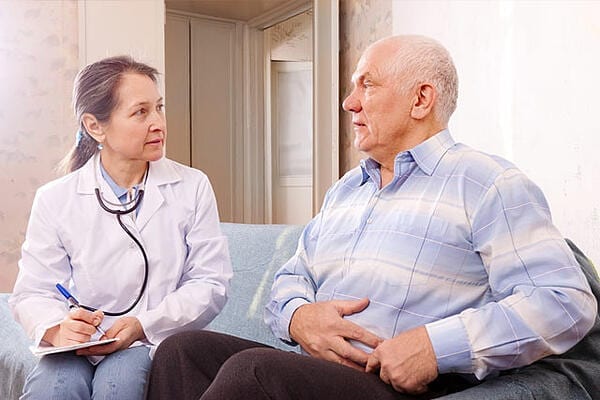What is Diverticulitis?
Diverticulosis is when pouches exist in the wall of the colon. If the pouches become infected or inflamed, which can occur due to a bout of constipation with high pressures in the colon or hard waste eroding the protective lining of the colon, this is called diverticulitis. This is when you begin to feel pain, typically in the lower abdomen (although it may feel like an extremely painful upset stomach). Diverticulitis can range from mild to severe. It is typically treated with antibiotics and a liquid diet, but occasionally requires hospitalization and even emergency surgery.
Cause and Symptoms
Currently, doctors are not completely sure what leads to the development of diverticulitis. Most do believe it is a result of constipation, which can come from a diet that is too low in fiber. Fiber is an important part of maintaining a healthy digestive system as it traps more water in the colon, helping to prevent hard waste. Over the decades, the lack of fiber in the diet leads to hard stool, which forces the colon to work harder to push out the body’s waste. The added pressure in the colon may lead to the development of diverticulosis pouches.
There are a host of symptoms you may experience. These symptoms can last anywhere from a few hours to over a week. The most common symptom is abdominal pain on the lower left side. You may feel a growing level of pain should you move. Oftentimes, people suffering from diverticulitis confuse it with an upset stomach. However, if the pain is recurring or lasts for longer than a few hours it may not just be from bad food. Besides the belly pain, you likely won’t feel like eating, may experience bloating or gas, suffer from fever or chills and have problems passing your waste. This is either in the form of constipation or diarrhea.
Identifying Diverticulitis
When you go to see the doctor, it may prove a bit challenging to directly diagnose your situation as diverticulitis. To know for sure, your doctor will likely perform blood tests and may even request a CT scan for a better look at your intestine.
Treatment
The exact kind of treatment is going to vary a bit. Your doctor will most likely prescribe rest, antibiotics and a liquid diet. Prescription pain medication should be used cautiously because it can mask worsening symptoms. A heating pad or some Tylenol can help. In more severe cases, a hospital stay may be prudent. This way, the doctor can keep a closer eye on your condition and can allow your digestive tract to rest even more by giving you intravenous fluids instead of a liquid diet. If after multiple attacks you continue to suffer from diverticulitis, or if you have complications from the disease such as abscess, perforation, or involvement of other organs, surgery may be required. However, only about six percent of people who suffer from this disease end up requiring surgery.
Foods to Eat and Avoid
To prevent the development of diverticulitis (especially if you have suffered from it in the past), you want to maintain a diet high in fiber. This includes fruits, whole wheat grains, and vegetables. The role that nuts and seeds may play in causing diverticulitis is unproven. You also want to limit red meat as this puts extra pressure on your digestive tract. Make sure to drink at least 64 ounces of water a day. Avoid caffeine and sugar, although tea is fine. Also, try to exercise every day to improve your circulation.
At ASC, we have a dedicated team of general surgeons and support staff that care for people with a broad variety of conditions, including diverticulitis, as well as benign tumors and cancers of many types. We also provide general surgery services for the treatment of hernia, appendicitis, hemorrhoids, and gallbladder disease among others. Our offices are in Fairfield County, Connecticut in the towns of Danbury and Ridgefield.


